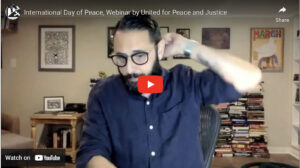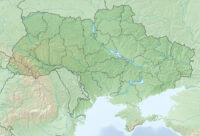On the heels of the September 21 People’s Climate March, a broad international network of NGOs is marking the first United Nations-led International Day for the Total Elimination of Nuclear Weapons by announcing plans for a major mobilization in the run-up to the critically important Nuclear Non-Proliferation Treaty (NPT) Review Conference. The NPT Review will be held at UN headquarters in New York City in April and May 2015.
Quoting the Call to Action, which was released today (see attached), Dr. Joseph Gerson of the American Friends Service Committee and a co-convener of the network said that “A nuclear weapon-free world can and must be achieved.” He continued, “The dangers of nuclear war didn’t disappear with the end of the Cold War. The United States and Russia engaged in potentially catastrophic nuclear weapons drills in the first days of the Ukraine War. ‘All options’ remain on the table threatening Iran, the U.S. has flown simulated nuclear attacks against North Korea, and scientists now tell us that an exchange of between 50 and 100 of the world’s more than 16,000 nuclear weapons would result in a global famine resulting in an estimated two billion deaths.”
Jackie Cabasso of the Western States Legal Foundation and also a co-convener of the international network, said: “The nuclear powers have refused to honor their legal and moral obligation to begin negotiations to ban and completely eliminate their nuclear arsenals. As we have seen at the United Nations High-Level Meeting for Disarmament and at the Oslo and Nayarit Conferences on the Human Consequences of Nuclear Weapons, the overwhelming majority of the world’s governments demand the implementation of the NPT. “We are working with partner organizations in the U.S. and other nations to mobilize international actions to bring popular pressure to bear on the 2015 Review Conference.”
The Spring 2015 Mobilization will highlight the inextricable connections between preparations for nuclear war, the environmental impacts of nuclear war and the nuclear fuel cycle, and military spending at the expense of meeting essential human needs – with $100 billion spent annually on nuclear weapons. The network demands that “the parties to the NPT …use the 2015 Review Conference to immediately, without delay, develop a time-bound framework for negotiating the elimination of their nuclear arsenals” and that the “four states outside the Treaty that have nuclear arms, India, Israel, North Korea and Pakistan….join any such negotiations.” Additional demands are to address the causes of climate change, and to cut military spending to meet human needs and to create green jobs.
Judith LeBlanc of Peace Action, the third network co-convener reported that “Plans include a major international peace conference and march to the United Nations on the eve of the Review Conference, the presentation of millions of petition signatures to the Review Conference urging the abolition of nuclear weapons, creative nonviolent protests in New York and in national capitals around the world, and student and youth organizing campaigns.
The Nuclear Non-Proliferation Treaty – which entered into force in 1970 – is one of the seminal international agreements of the 20th century. Its three pillars committed the non-nuclear nations never to acquire nuclear weapons, while in exchange the nuclear powers committed in Article VI to engage in good faith negotiations to completely eliminate their nuclear arsenals. It also recognizes the right of all NPT signatories to develop nuclear energy for peaceful purposes – a serious flaw in the Treaty. A Review Conference is held at the United Nations every five years, providing the world’s nations an opportunity to hold one another accountable to their Treaty commitments.
Should the 2015 NPT Review Conference fail to mandate the commencement of abolition negotiations, the Treaty itself could fail, accelerating nuclear weapons proliferation and increasing the likelihood of catastrophic nuclear war.
The network’s coordinating and advisory committees for the Spring 2015 Mobilization include representatives of major peace, justice and environmental networks and organizations, as well as scholars and physicists. They include: Abolition 2000 (international), American Friends Service Committee (US), Campaign for Nuclear Disarmament (Britain), Earth Action (international), International Association of Peace Messenger Cities, International Peace Bureau, International Physicians for the Prevention of Nuclear War, Japan Council against A- & H-Bombs (Japan), Mayors for Peace (international), Le Mouvement de la Paix (France), Nuclear Age Peace Foundation (US), Parliamentarians for Nuclear Non-Proliferation and Disarmament(international), Pax Christi International, Peace Action (US), Peace Boat (Japan), Western States Legal Foundation (US), United Methodists (US), United for Peace and Justice (US), World Peace Council, World Council of Churches, and many others.
The new Campaign web page is under construction. The Call to Action and list of Coordinating and Advisory Committee members can be found at http://afsc.org/resource/2015-npt-related-organizing.


